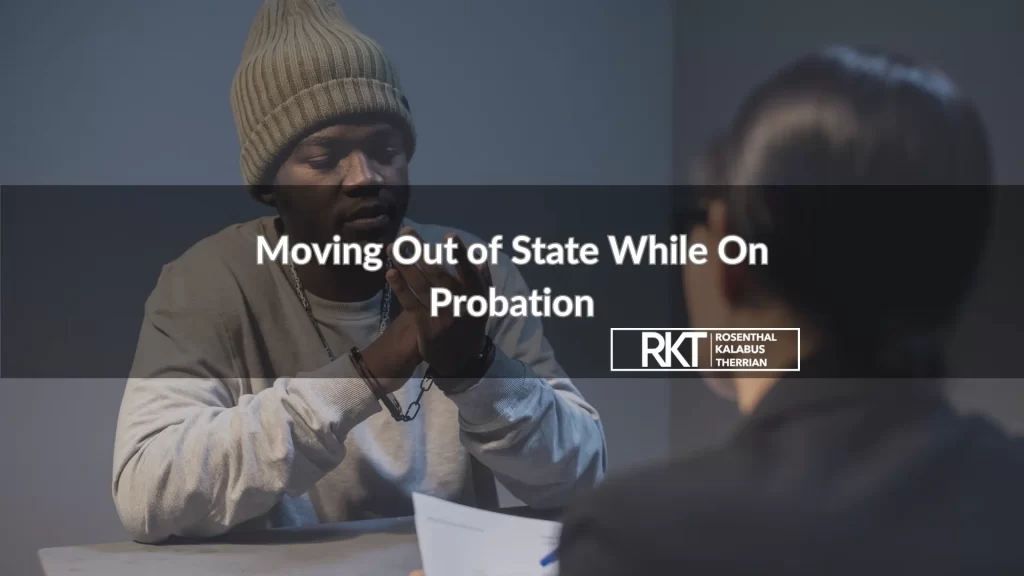
In most misdemeanor–and many felony–cases, defendants are not sent to jail upon conviction. Instead, Texas law allows the judge to sentence the defendant to community supervision. It is more commonly known as “probation” in other states. Probation basically means the defendant remains free, subject to his or her compliance with certain conditions imposed by the court. In misdemeanor cases, probation can last up to 2 years. In felony cases, probation may run as long as 10 years. Although it is possible to seek early release under certain circumstances. But what happens if you want to move out of Texas while on probation?
If you are under community supervision in Collin County, Texas, you know that you must frequently report to a probation officer. You must also typically obtain your probation officer’s permission to change jobs or residences. This raises several questions you might not have previously considered: What if I want to move outside Texas? Can I do so? And does my probation continue in my new state? Alternatively, if you are currently serving probation in another state, is it possible to move to Texas?
The short answer is yes. It is possible to move from one state to another while on probation. Texas is part of a legal agreement known as the Interstate Compact for Adult Offender Supervision. This is basically a contract between the 50 state governments and the District of Columbia that makes it possible to “transfer” probation from one jurisdiction to another.
Mandatory Transfer of Supervision
So how does the Interstate Compact work? Let’s say you are serving probation here in Texas and want to move to Arizona. To make that happen, you must file an application with your probation officer before you move. If your probation officer and the State of Texas approve your application, it is sent to Arizona officials for their review and approval.
In some cases, the receiving state–Arizona, in our hypothetical example–must accept your application. This is known as a “mandatory transfer of supervision.”
But you are only qualified for a mandatory transfer if you meet all of the following conditions:
- There are more than 90 calendar days left on your term of probation.
- You have a “valid plan of supervision.”
- You are in “substantial compliance” with your existing probation conditions.
- You are a resident of the receiving state.
- You have family members who live in the receiving state and are willing and able to assist with your supervision plan.
- You can obtain a job in the receiving state or possess other financial means to support yourself.
There are also scenarios where a receiving state must accept a qualified transfer from an offender who is either a member of the armed forces or a family member who lives with a member of the armed forces.
For example:
- You are a member of the armed forces currently on probation in Texas and have been deployed to the receiving state.
- You are a civilian on probation in Texas but married to a spouse deployed to the receiving state.
Along similar lines, if you or your spouse hold a non-military job and a transfer to another state is necessary as a condition of maintaining your employment, you are eligible for a mandatory transfer under the Interstate Compact, assuming the person on probation still meets all of the other conditions described above.
Discretionary Transfers
Even if you do not qualify for a mandatory transfer of supervision, you can still apply for a discretionary transfer under the Interstate Compact. Remember, however, that discretionary means that neither the sending nor the receiving state is obligated to grant your request. Under the Interstate Compact, the sending state must provide “sufficient documentation” to justify an offender’s request. But the receiving state is still free to say no, provided they specify their reasons.
Also note that even in mandatory transfer cases, the receiving state still has the right to conduct an investigation to ensure the offender meets all of the requirements under the Interstate Compact. According to the terms of the agreement, the receiving state typically has 45 calendar days from receiving the sending state’s request to complete its investigation.
Challenging an Unfair Probation Sentence in Collin County
 Challenging sentences is one option Collin County defendants have if they are on probation. If you believe you received an unfair sentence, our skilled attorneys can take the following steps on your behalf:
Challenging sentences is one option Collin County defendants have if they are on probation. If you believe you received an unfair sentence, our skilled attorneys can take the following steps on your behalf:
- Identifying Errors: The foundation for challenging any sentence is identifying errors. These could stem from procedural errors in the trial court, prosecutorial misconduct, or juror bias.
- Tackling Prosecutorial Misconduct: If the prosecutor withheld exculpatory evidence or deliberately excluded jurors based on race or other protected characteristics, that’s illegal. A proficient attorney can pinpoint and leverage such misconduct.
- Addressing Trial Court Mistakes: Erroneous rulings, such as excluding evidence in your favor or admitting prejudiced evidence, can influence your sentence. Your attorney can challenge these mistakes to seek a fairer outcome.
- Upholding Your Rights: A violation of your right to a speedy trial or the imposition of illegal sentences can be grounds for an appeal. An attorney can push for a more equitable judgment by upholding these rights.
- Leveraging New Evidence: Post-conviction proceedings can introduce evidence unavailable during the original trial. This might include new exculpatory evidence, such as DNA results or someone else’s confession. This new evidence could lead to alterations in your probation terms or even dismissing your charges.
- Highlighting Ineffective Counsel: If your original attorney failed their duties, you may have the right to a new trial or appeal.
- Navigating the Appeals Process: A skilled lawyer can guide you through the complex appeals process. This starts with filing a notice of appeal within 30 days of the trial verdict.
Challenging a probation sentence isn’t straightforward. With seasoned attorneys like those at Rosenthal Kalabus & Therrian, you can receive a just sentence better.
Want to Move Out of Texas? Contact a Collin County Criminal Defense Lawyer Today
This is only a brief overview of the Interstate Compact and how it works. Suppose you have any further questions about how transferring your probation to or from another state may apply to your family situation. In that case, you must speak with a qualified criminal lawyer in Collin County. Contact the dedicated Collin County probation violation lawyers at Rosenthal Kalabus & Therrian if you need immediate legal advice or assistance.